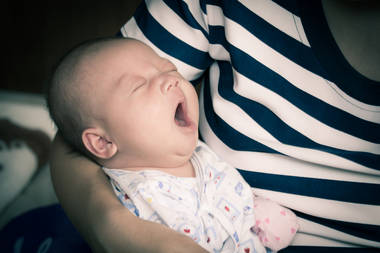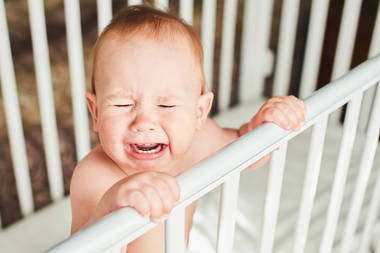at what age should a child be able to put themselves to sleep
Slumber Myth 1: After to bed = Baby sleeps afterward in the morning
Sleeping in—it's wishful thinking for many parents. Really, the idea that babies will sleep later if put to bed later is a common myth. Babies sleep ameliorate, longer, and cry less if they are put to bed early on in the evening. Babies who go to sleep late in the evening are often "over tired", even though they seem to have energy.

Look for your infant'due south "sleep signals" that show when she is tired. Seize the moment before the "sleepy window" has passed. The first signs of tiredness—middle rubbing, yawning, slowing downwardly—should signal a transition to the bedtime routine. This may occur as early on as half-dozen:00 or 7:00 pm for babies.
Sleep Myth 2: Babies should sleep through the night
Many parents dream of nil more than getting their baby to sleep through the night. Well-nigh babies take the capacity to make it 8 hours or more without a feeding when they are most 4 months and at to the lowest degree 16 pounds. If babies at this age and phase are even so waking up in the eye of the night, the problem is usually not the waking up…it's the getting dorsum to sleep.

Most babies (and adults) wake up one or more than times during the nighttime. Equally adults, we usually only curl over and go dorsum to slumber. Babies typically wake two to four times a night. But while some babies cry briefly and then soothe themselves back to sleep, others don't. They accept not nevertheless learned how to get themselves back to slumber, so they cry out for help.
The fundamental is helping your babe acquire how to become herself to sleep. Creating a soothing routine of lullabies, books, and rocking earlier bedtime is very important. Then put your infant down in her crib while she's withal awake. This gives her the take chances to learn what information technology feels like to fall comatose on her own.
If your child is over one twelvemonth of age, consider offer him a "lovey" (stuffed animal or special blanket). Babies will ofttimes comfort themselves with these objects, which helps them autumn asleep. Y'all may as well hear your infant singing or talking to herself before drifting off to sleep. These are all ways babies have of putting themselves to sleep.
Sleep Myth three: "Crying It Out" is bad for infant

Crying is a common and (understandable!) response to saying practiced-bye to a loved parent at bedtime. Withal, learning to autumn asleep on ane's own is an of import skill that you can help your infant acquire when she is quondam plenty—at nigh iv months.
Most experts and research concur that letting a baby or toddler cry as they go to slumber will not have any long-term damaging effects. A child who is well-loved, nurtured, and responded to during the day will not be hurt by fussing a fleck before bed in the evening. And the good news is that the crying at bedtime will probably only go on for a few days before your baby adapts and begins to learn how to put herself to sleep.
But that doesn't mean it's an easy choice for parents. Many parenting decisions, and especially this i, involve agreement temperament—not only your baby'south, only your own equally well. If letting your baby cry herself to sleep is as well emotionally painful for you lot, at that place are other options. For case, you tin go dorsum to cheque on her every 10 minutes (but without rocking or nursing her). Or, you tin can make up one's mind on a certain length of crying that you lot are willing to put up with (say fifteen minutes) and if the crying goes across that, you will get in to comfort the infant. Some other option, if your partner is able to endure more than of the crying, is that he or she takes on the bedtime routine. In any case, it is of import for the two of y'all to be in understanding nearly your bedtime plan. Finding an approach that works for both your baby and your family is important.
Sleep Myth 4: Babies on solid foods sleep longer

Many parents have heard that starting solids early (before iv-vi months) or adding cereal to their baby's bottle will help their child sleep through the nighttime. This is a myth. At that place is no research to back up it, and in fact, the American Academy of Pediatrics discourages feeding babies solid foods before four months of age. This is due to their immature digestive systems and their lack of oral-motor skills. Some studies even indicate that early on introduction of solids can trigger food allergies.
It is normal and expected that babies younger than four months volition wake during the dark. Beginning at most 4 months, you tin get-go helping your baby acquire to slumber though the night. (See above on how to teach your babe to fall asleep on his own.)
Until then, your young baby will be plenty full on a liquid (breastmilk or formula) diet, without using solids. Make the baby's last feeding part of his bedtime routine. And try to put your baby downwards while he is still awake, only drowsy. If yous have concerns about your child's weight gain or sleep patterns, talk to your wellness care provider.
Source: https://www.zerotothree.org/resources/1082-common-myths-about-baby-sleep-challenges
0 Response to "at what age should a child be able to put themselves to sleep"
Post a Comment